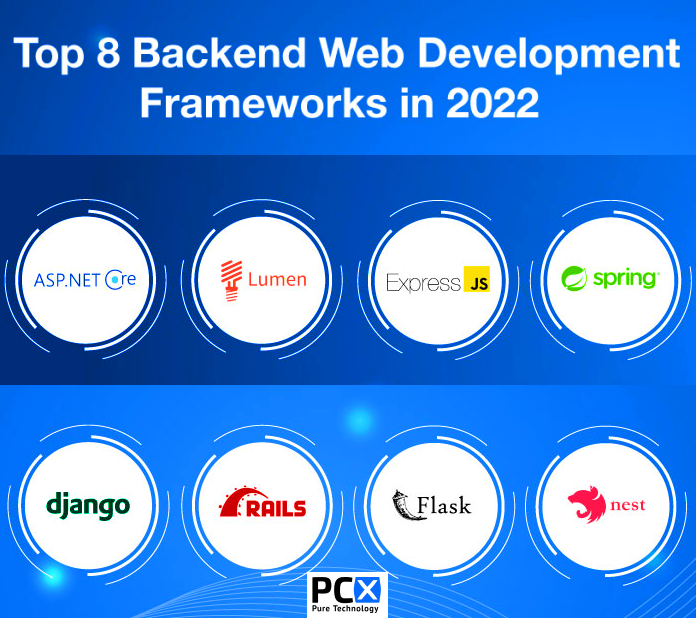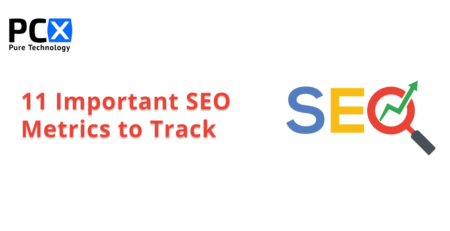Top eight Backend web development Frameworks in 2022
Today, the concept of digital transformation impacts all organizations, no matter their business sector or specialization. A company’s digital presence is driven by digital transformation as it helps to meet customer needs. Digital presence refers to how a company appears online through a website or mobile app.
Ten years ago, a company’s digital presence was limited to static websites or PHP web applications built on the popular LAMP (Linux, Apache, MySQL and PHP) stack. But not anymore! The web development model has continued to evolve over the years, with the advent of frameworks and APIs. The framework is now an essential part of web development to create a rich, interactive web experience. Many frameworks are available for both front-end (client-side) and back-end (server-side) web development.
Backend frameworks are server-side programming language libraries that help build the backend structure of a website. The backend framework provides a complete set of tools for building dynamic websites. Using a framework allows developers to get started by eliminating the need to build and configure everything from scratch.
What is a standard backend web development framework?
Coding tools, supporting languages, linking, etc. Although there are many evaluation frameworks, the process of evaluating the framework must first be universal. Purpose is really important as a powerful and expressive language that enables developers to create web applications or APIs, including single page applications (SPAs).
Since back-end systems are written in different languages such as Python, PHP, Ruby, Java and have different features, choose the right back-end website that is mostly developed according to the features required by the application. Here are the top 8 backend web development trends that will continue to be popular in the developer community in 2022.

(1) ASP.NET Core
ASP.NET Core, first released in 2016, is an open source version of ASP.NET. It is a redesign of the Windows-only version of ASP.
open. ASP.NET Core, a popular web development platform for developing web applications on the .NET platform, is faster than the current framework. Basic features of ASP.
NET Core:
- ASP.NET applications can run on Windows, Linux, macOS, and Docker
- Designed to allow rapid changes to runtime components, APIs, languages, and compilers
- Various aspects of ASP. NET Core on the human server
- Many support lifecycle options to meet application specific needs.
(2) Laravel and Laravel Lumen
First launched in 2011 under the MIT license, Laravel is an open source PHP framework based on the MVC architecture. Laravel is the best tool for building blogs, news and e-commerce sites. With its intuitive interface, ready-to-use API support and extensive libraries, Laravel makes it easy to develop secure and modern web applications. Laravel is a young and beginner-friendly framework with the following features:
- Own command line interface (CLI)
- Blade template engine that provides lightweight front-end templates • Experience simple support PHP code
- Excellent community support and documentation for • Database Migration System
On the other hand, Laravel Lumen is a lightweight micro-framework built on top of Laravel. It’s a simpler, leaner version of the full site that makes the site grow faster. Launched in 2015, Laravel Lumen allows developers to build high-performance microservices and APIs. The following features make Lumen a favorite among the developer community:
- Clear and elegant syntax
- Simplifies tasks such as routing, database abstraction, queues and caching
- Built-in debugger allows for fast debugging and debugging.
- Compatibility with Google App Engine
(3) Express.js
Express.js is a popular framework trusted by international brands like IBM and Accenture for its advanced features. Express.js supports REST API implementations with high flexibility.
Released in 2010, Express or Express.js is a minimal Node.js web application format that provides web development features including:
- Minimalist and fast web framework
- Simple and direct learning for configuration
- Excellent routing API
- Provides many plugins to use
- Provides many HTTP utilities to create powerful and familiar APIs.
(4) Spring
Spring is a lightweight open source framework based on Java for developing standalone and production-level Spring-based applications. First released in 2002, Spring used the Spring platform and third-party libraries to help developers get started with less hassle. Some of the benefits of the Spring Boot framework are:
- Helps prevent complex XML configuration in spring
- Microservices planning framework
- Provides powerful functionality
- Helps manage REST endpoints
- Simplifies dependency management
(5) Django
Released in 2005, Django is one of the most popular open source projects written in Python. Django is often referred to as a professional website that works with deadlines, based on DRY (Don’t Repeat Yourself), which means reusing existing code and focusing on the new, allowing developers to work very quickly. Widely used for building fintech applications, reservation engines, and e-commerce applications for greater security, Django’s key features include:
- Scalable and customizable capabilities
- Supports rapid development
- Wide community support and comprehensive documentation
- Battery powered Revenue Capacity
- Advanced Model-View-Template (MVT) Framework
(6) Ruby on Rails (RoR)
Ruby on Rails is a server-side web application framework written in Ruby, available under the MIT license. Backed by a large and friendly community, RoR is an excellent framework with everything a developer needs to build great apps. Since its launch in 2004, hundreds of thousands of apps have been built using the framework, including Shopify, Airbnb, GitHub, and Hulu, among others. The main features of RoR include:
- Ruby on Rails uses the Model-View-Controller (MVC) architecture
- RoR refers to the principle of Contracting Over Configuration (CoC) and Repeat Self (DRY) rules
- The process is easy to update existing rules. Simple
- Rails community proactively identifies and fixes new vulnerabilities
(7) Flask
Very popular with Python developers, Flask is a lightweight and extensible backend web framework. Flask helps developers keep content interesting and understandable in their web applications. The framework is classified as a micro-framework as it does not require special tools or libraries. Flask is a “do-it-yourself” non-standard web framework derived from data abstraction layers and third-party libraries. The micro-framework is based on the Jinja templating engine.
Key features of Flask include:
- Fast debugger and built-in developer server
- Jinja2 templating
- Flexible framework with lightweight and modular design
- RESTful request submission
(8) NestJS
The open source, versatile and extensible Node.js framework is designed to build robust and robust backend systems. It is the fastest growing version of the Node.js framework in TypeScript. It can be used to write testable, scalable and loosely coupled applications.
It supports databases such as MongoDB, MySQL and PostgreSQL. It is influenced by React, Vue and Angular and provides great reliability.
Some of the key features of Node.js are:
- Easy to learn and use, a superset of JavaScript
- CLI or command line interface is powerful enough to easily develop and increase productivity
- Knowledge and convenience
- MIT Open Source License
- Mongoose provides broad support for socket-centric modules that are easy to integrate with technologies such as TypeORM, Logging, GraphQL, WebSockets, and Validation.
Results
Choosing the right technology for web development, including backend, will not be a piece of cake, it depends on the application of the material paper and accompanying equipment. Although most manufacturers prefer to use familiar techniques, as the industry continues to move towards technology, that is, new technology, they are often left with no choice but to try new techniques that they have not used before. However, entering unknown territory by trying new techniques is both fun and educational.
Call us for a professional consultation







Leave a Reply